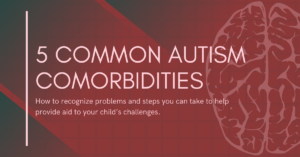
Children with autism often struggle with more than we realize. Medical comorbidities are common for those with ASD and can range from ADHD to gastrointestinal issues. Read on to learn more about comorbidities and the best course of action for navigating these coexisting medical conditions.
What Is Comorbidity?
According to the Centers for Disease Control and Prevention (CDC), comorbidity is when a person has more than one disease or condition at the same time. For children with autism, it is estimated that 85% have some form of comorbid psychiatric diagnosis, and the numbers vary widely for more physical issues like gastrointestinal or those related to fine/gross motor skills.
Gastrointestinal Issues and Autism
Mannion et al. found that 79.3% of children with autism display some kind of gastrointestinal symptoms. Of the GI problems reported in subsets of autistic individuals, the most common are chronic constipation, diarrhea, and abdominal pain. Because many children with autism are selective eaters, they often have poor diets and weight-related issues.
An inability to express needs and desires can leave these kinds of gastro problems unchecked. This could lead to “self-injury to the abdomen or other areas to detract from GI pain, or vocal groaning or screaming. In addition, other comorbidities, including sleep disturbance and abnormal feeding behaviors, such as pica, can arise because of GI complications, including pain and acid reflux.”
Some ways that children with autism can start to build a more balanced diet include:
-
Working with a dedicated care team and dietician
-
Increasing food exposure in a natural environment
-
Using shaping and differential reinforcement
-
Utilizing imitation and peer modeling
If you want a more detailed look about how nutrition affects children with autism, haga clic aquí.
Autism and ADHD
According to scientific literature, 50 to 70% of those with autism also have attention deficit hyperactivity disorder (ADHD).
ADHD typically describes children who get distracted easily, have trouble paying attention in the classroom, lose things, and are unable to focus on a continuous subject. While some of these symptoms exist for children with autism, some other symptoms specific to those with ASD include an inability to make eye contact, a lack of interest in playing or engaging with others, and an inability to speak or communicate with others.
Typically, a child diagnosed with just ADHD will receive medication, but treatment varies for an ADHD and autism comorbid diagnosis. Working with a care provider who understands both conditions is essential to creating an effective treatment plan. Typically, those with autism don’t respond well to the medication used for ADHD, so providers typically recommend Terapia ABA to help manage symptoms and daily life skills.
If you want to learn more about the differences and similarities between ADHD and autism, check out our blog.
Epilepsy and Autism Spectrum Disorder
In the general population, there is a 1.2% rate of epilepsy. Some reports, nearly half of all people with autism have epilepsy. In a study with 85,000 participants, those diagnosed with epilepsy are ten times more likely to have autism.
Epilepsy onset typically occurs during early childhood and adolescence, and children with autism are prone to most types of seizures. Researchers theorize that there is a common biological link between the two disorders and that epileptic symptoms may play a part in some of the symptoms associated with some cases of autism spectrum disorder.
Treatment for those diagnosed with epilepsy and autism seems varied, but antiepileptic drugs (AED) and a combination of developmentally-based early interventions for ASD, like ABA therapy, are typically recommended.
Trouble Sleeping With Autism
According to Dr. Suzanne Goldman of Vanderbilt University, it is estimated that 48% of adults have trouble falling and staying asleep, while a staggering 80% of adults and children diagnosed with autism struggle to fall and stay asleep.
There have been a handful of studies into why children with autism struggle to sleep, all listing many different causes, but a consistent pattern of causes includes:
-
Sensory sensitivities
-
The body not producing enough melatonin naturally
-
A poor diet or gastrointestinal problems
-
Anxiety, depression, or ADHD
-
Not enough physical activity throughout the day
-
Bedwetting
-
Nightmares or night terrors
-
Sleepwalking
Neurotypical people typically understand the cycles of light and dark and have a natural circadian rhythm that tells them that bedtime is approaching. However, seeing others brushing their teeth or getting into pajamas may be cues that get lost or misinterpreted by children with autism.
The best-proven treatment for sleep issues in children with autism is a consistent bedtime routine.
haga clic aquí for tips on creating a bedtime routine, what you can do during the day to prepare for better sleep at night, and more.
Depression and Autism
People with autism tend to have a higher rate of depression and are more likely to experience hopelessness and social withdrawal. In a study by Matthew J. Hollocks et al., “The pooled estimation of current and lifetime prevalence for adults with ASD were 27%.”
Depression typically occurs more frequently during adolescence when children with autism start to become aware that they act and think differently than their peers.
Some symptoms of depression can include:
-
Persistent feelings of sadness, hopelessness, and worthlessness
-
Frustration and irritability
-
Loss of interest or pleasure in activities
-
Tiredness and lethargy
-
Difficulty thinking or concentrating
-
Sleep problems
-
Changes in weight and appetite
-
Headaches and pains around the body
-
Suicidal thoughts
Treatment for depression can include therapy, medications, or a combination of both. If a child with autism is experiencing symptoms of depression, it is best to consult a care physician as soon as possible.
This List Is Just a Start
There are many more comorbidities that can occur in children with autism, ranging from intellectual disabilities to Fragile X syndrome. Every child with autism is unique and will have to face personalized challenges to reach their goals and live a fulfilling life.
If you have a child who has been diagnosed with autism and want to get started with ABA therapy, haga clic aquí.
Fuentes citadas:
Canitano, R., Palumbi, R., Scandurra, V. Autism With Epilepsy: A Neuropsychopharmacology Update
Centros de Control y Prevención de Enfermedades. Comorbidities.
Centros de Control y Prevención de Enfermedades. Epilepsy Data and Statistics.
Children’s Hospital of Philadelphia. Autism’s Clinical Companions Frequent Comorbidities With ASD.
Goldman, S. Defining the Sleep Phenotype in Children With Autism.
Hollocks, M., et al. Anxiety and Depression in Adults With Autism Spectrum Disorder: A Systematic Review and Meta-Analysis.
Hours, C., Recasens, C., Baleyte, J. ASD and ADHD Comorbidity: What are We Talking About?
Hsiao, E. Gastrointestinal Issues in Autism Spectrum Disorder.
Hughes, V. Scientists Probe Puzzling Overlap of Epilepsy and Autism.
Mannion, A. & Leader, G. Comorbidity in Autism Spectrum Disorder: A Literature Review.
Medical News Today. What to Know About Autism and Depression.
Sundelin, H., et al. Autism and Epilepsy.







